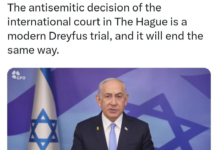Boko Haram is a terrorist group founded in 2002 and has been reported to operate in northeast Nigeria, Cameroon and Niger, writes Dr Ilyas Mohammed.
It is fervently anti everything that sounds or looks Western and wants to establish an Islamic state. This is not to suggest that its influence, its affiliations and activities are restricted to the aforementioned countries.
Boko Haram has been widely criticised by the international community for its campaign of violence against civilians and the Nigerian state, resulting in many Muslim and Christian deaths. The Nigerian government has also come under scrutiny for its inability to effectively tackle Boko Haram, provide security and prevent further attacks.
The abduction of an estimated 300 Nigerian Muslim and Christian schoolgirls by Boko Haram from two north-eastern Nigerian villages in April and May seems to have been the final straw for leading Western powers, and compelled them to act beyond words. Following the abductions the group released a video where its leader Abubakar Shekau states: “The girls should not have been in school in the first place, but rather should get married. God instructed me to sell them, they are his properties and I will carry out his instructions.”
It is not clear if the reason for the intervention is purely due to the abductions of the schoolgirls, or if the abductions are a pretext to control and restructure parts of Africa that are rich in natural resources. One only needs to look at Libya and Mali to realise the length Western powers are willing to go to secure energy resources. Whatever the real reasons are it is clear that the mood in Paris, London and Washington has changed.
In response to the abductions the US Secretary of State John Kerry said: “We remain deeply concerned about the welfare of these young girls, and we want to provide whatever assistance is possible in order to help for their safe return to their families.”
President Obama stated the US was sending in a team of our military, law enforcement and other experts and “we’re really glad that Nigeria has accepted the help.”
Subscribe to our newsletter and stay updated on the latest news and updates from around the Muslim world!
The British Foreign Sectary William Hague saidt hat the UK had offered the Nigerian government help and added that: “What has happened here… the actions of Boko Haram to use girls as the spoils of war, the spoils of terrorism, is disgusting. It is immoral.”
Muslim silence
Unsurprisingly most Muslim leaders in the main have remained silent, those that have criticised Boko Haram have done so, not because of the group’s heinous violence and the abduction of the schoolgirls, but because of the use of Islam as a justification.
Most Muslims in the West and the Muslim world have also remained silent on the issue. They have not turned to street protests or to social media to demonstrate their disgust at the abductions of the schoolgirls.
In the past Muslims have taken to the streets and turned to social media to protest over all sorts of concerns, some of which are serious and others trivial. Serious issues that Muslims have protested over include Western oppression of Muslims, Western violence towards Muslims, far-right groups attacking Muslims and desecrating mosques, and Western media mocking the Prophet Muhammad.
The most trivial and most recent issue that engendered moral outrage among some Muslims was a video entitled “Happy British Muslims.” This led to many Muslims turning to social media to condemn all the Muslims that were involved in its production.
The abduction of the schoolgirls begs a number of important questions for all Muslims. Where is the Muslim condemnation and moral outrage at the actions of Boko Haram? Is the lack of outrage among Muslims because Boko Haram is a Muslim group and most of its victims are also Muslim? Is it because the victims are not Asian or Arab but black Muslims from Africa who reside at the bottom of the Muslim hierarchy, and their suffering is not equal to the suffering of other Muslims?
Or do Muslims have different ethical and moral frameworks for the suffering of different types of Muslim and non-Muslims, which are dependent upon sectarian divisions, inter-religious divisions and ethnicity?




















